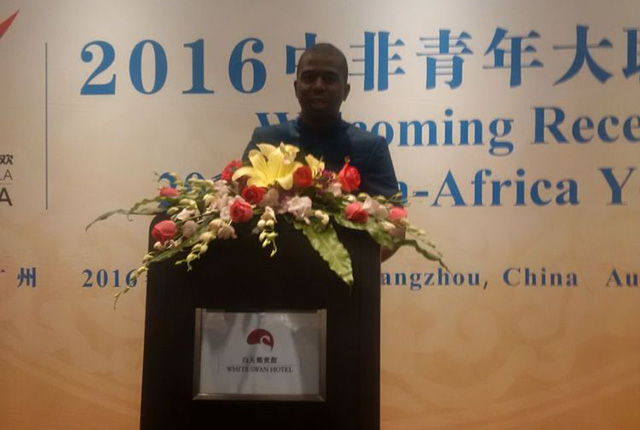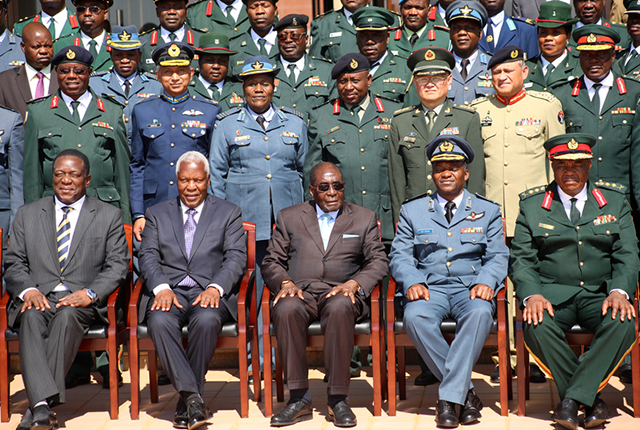‘The future belongs to the youths’


Brian Mudumi . . . “There is a huge potential for vibrant business-to-business cooperation between China and Africa. China has more than one billion people. With such a size, it cannot produce everything.”
The Interview with Tichaona Zindoga
TZ: First of all, Mr Mudumi, you were recently in China for the first Asia-Africa Summit and the China-Africa Youth Gala. Can you explain what these were and their significance?BM: Recently, I led a delegation of young people to the first ever Asia-Africa Youth Festival and China-Africa Youth Gala in China. These forums were a milestone in promoting people-to-people cooperation among the youths. They focused on establishing a long-standing relationship and deepening both Asia-Africa and China-Africa relations through youth inclusion. The events hosted more than 400 young delegates on each event. We started by Asia-Africa Youth Festival in Beijing. The event brought together young delegates from both continents focusing on advancing mutual understanding and contributing to the development of both Africa and Asia.
As you know, Asian and African countries constitute the biggest youth population. The event was important in upholding cooperation peace and development. The opening ceremony at the Golden Hall at the Great Hall of the People of China, where we had address from youth representatives from across the two continents and also the launch of the Asia-Africa Youth Festival Logo
These events were a follow-up to Chinese President Xi Jingping’s call for active youth participation in Asia-Africa cooperation at the 2015 Focac Summit in Johannesburg. Both events were vital in the promotion of unity, peace and development. It was noted that Asian and African countries have a shared history, hence tours to the cultural and development centres which were meant to stimulate and inspire youth enhancing the Bandung Spirit.
TZ: Is it possible to have a platform where young people actually shape the future of both continents, Asia and Africa, as espoused by the Bandung Spirit and indeed between China and Africa where young people can influence policy?
BM: Yes, youths should take up the initiative to be key stakeholders in the development of their nations. In this context, these forums were empowering Asian and African youths to play a pivotal role in upholding cooperation and development, the people who build China did it during their youth. China has produced young entrepreneurs who turned billionaires and are players in the Chinese economy.
Sixty percent of the world population is made up of youths. If they are included in the decision and policy-making processes, it can spur development and cooperation. In this digital age, youths are the most active group so if they are empowered to influence policy, they can influence development that match with current situations.
The future belongs to the youths, therefore, they are an important force in turning the China-Africa common vision into reality. Our elders have sacrificed a lot in their youthful stages for us to gain what we have, therefore, more people-to-people cooperation among the youths can cultivate a managed future with shared dreams.
TZ: There seems to be an unwritten rule that Africans have all to learn from China and never the other way round. Can this be true from your assessment of China-Africa relations?
BM: No, no, no! That is not true. The relationship between China and Africa is characterised by mutual benefits. Well, there are a lot of lessons we can draw from China and give them African characteristics. The Chinese are learning a lot too. For your own information, China has established institutes and think-tanks that focused on African culture, language, business, history and other things so it is their endeavour to understand more about Africa as they consider us their partners.
The Chinese government has a budget for exchange programmes where it promotes more understanding. This shows their commitment to understand African cultures. China is also the source of the biggest number of tourists to Africa. This shows the quest of the Chinese to understand more of Africa on cultural grounds.
There was a lot around language and business during both events. A lot of Chinese youths spoke African languages.
There is a huge potential for vibrant business-to-business cooperation between China and Africa. China has more than one billion people. With such a size, it cannot produce everything. Business cooperation is highly concentrated at the bilateral and multilateral levels, on a government-to-government level, thus the talk of mega-deals being signed.
However, there is a lot that can be done towards direct interaction of businesses. African producers can supply the Chinese market, for example, Zimbabwean oranges pernetrating the Chinese market through South Africa. We can have direct cooperation where the Zimbabwean players can directly supply their products to China.
There are established platforms like the business councils. These should be utilised to facilitate two-way business interactions between China and Africa. We have diplomats responsible for business and commerce on both sides. These must be utilised to enhance people-to-people cooperation on the business side.
On every Chinese meal, there is beef, maize and potatoes. China alone does not have the production capacity for its consumption.
I think China and Africa should do more in promoting people-to-people business interactions where their citizens can also have open business cooperation. The business relations should give value to both parties.










Comments